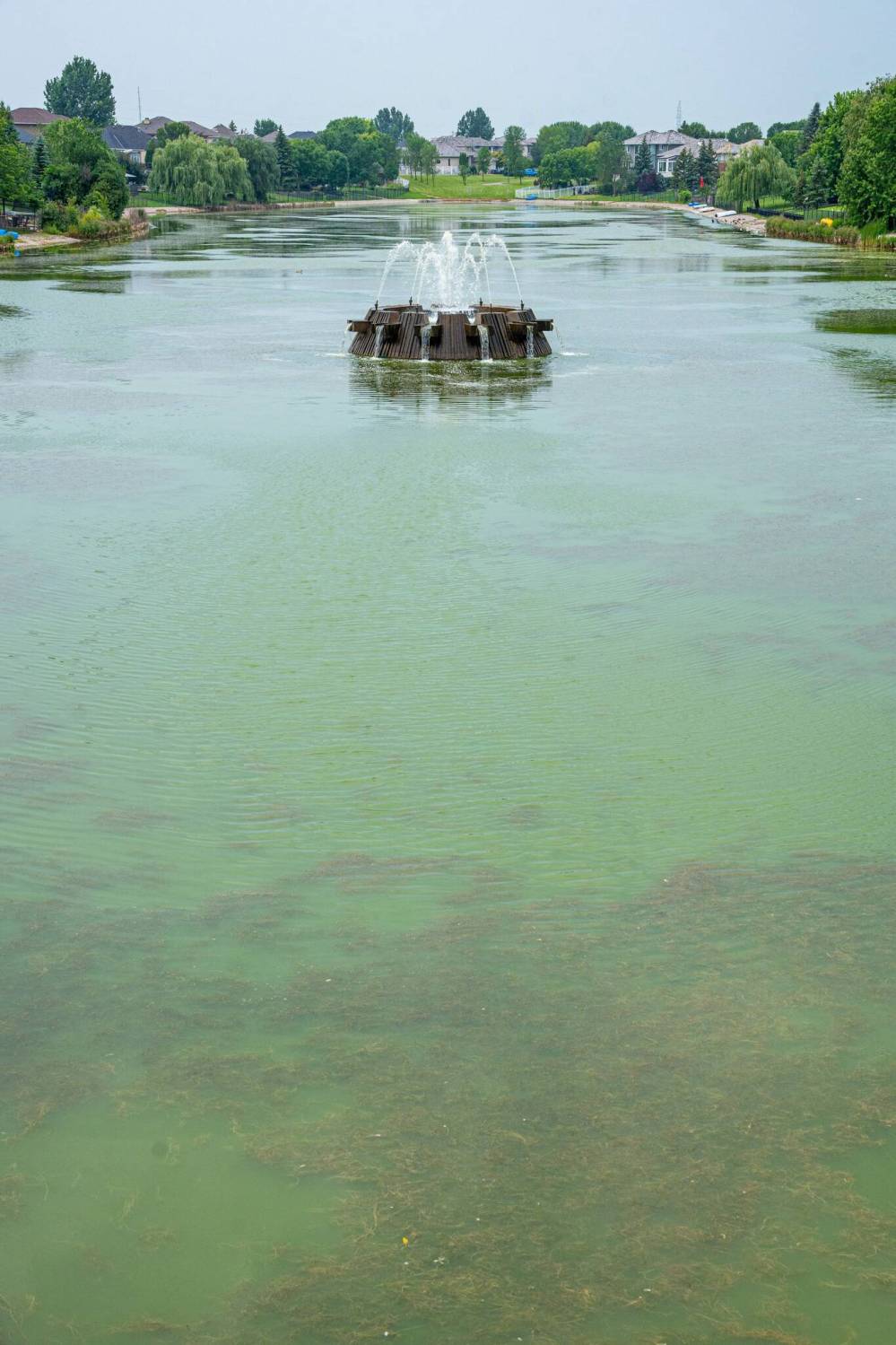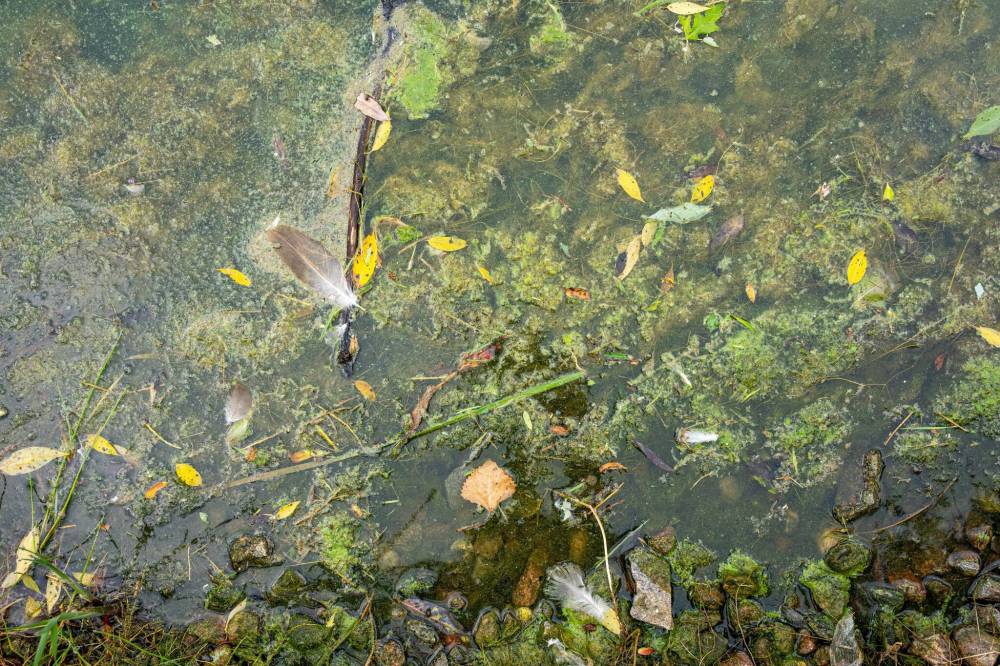Retention ponds loaded with algae Province orders city to stop using herbicide
Read this article for free:
or
Already have an account? Log in here »
To continue reading, please subscribe:
Monthly Digital Subscription
$0 for the first 4 weeks*
- Enjoy unlimited reading on winnipegfreepress.com
- Read the E-Edition, our digital replica newspaper
- Access News Break, our award-winning app
- Play interactive puzzles
*No charge for 4 weeks then price increases to the regular rate of $19.00 plus GST every four weeks. Offer available to new and qualified returning subscribers only. Cancel any time.
Monthly Digital Subscription
$4.75/week*
- Enjoy unlimited reading on winnipegfreepress.com
- Read the E-Edition, our digital replica newspaper
- Access News Break, our award-winning app
- Play interactive puzzles
*Billed as $19 plus GST every four weeks. Cancel any time.
To continue reading, please subscribe:
Add Free Press access to your Brandon Sun subscription for only an additional
$1 for the first 4 weeks*
*Your next subscription payment will increase by $1.00 and you will be charged $16.99 plus GST for four weeks. After four weeks, your payment will increase to $23.99 plus GST every four weeks.
Read unlimited articles for free today:
or
Already have an account? Log in here »
Hey there, time traveller!
This article was published 30/07/2024 (467 days ago), so information in it may no longer be current.
Retention ponds around Winnipeg are packed with algae and murkier than usual this summer after the city stopped using a previously approved herbicide to clean the man-made bodies of water.
Diquat, known by the brand name Reward, is a common aquatic herbicide used by municipalities to limit plant growth in retention ponds. The product has been registered for use in Canada since 2000.
But a discrepancy in the product’s label was reported to the province earlier this year. An inquiry found Reward is authorized only for the treatment of aquatic invasive species, and the city’s licence to use it was revoked in the spring.
“We were only made aware of the issue when our licence was changed,” a city spokesperson said Tuesday.
The manufacturer’s product label indicates it can be used in open bodies of water — including retention ponds — that drain into water where fish live.
“We were only made aware of the issue when our licence was changed.”–City spokesperson
However, the federal Fisheries Act does not allow chemicals to be used in water where fish live unless it’s specifically applied to control aquatic invasive species, a provincial spokesperson told the Free Press Tuesday.
It is unclear who brought the issue to the province’s attention.
One Whyte Ridge resident said he’s noticed a difference in the amount of algae in the pond near his home.
“The algae in some years is quite a bit worse than other years,” said Larry Rigaux, who has lived in the neighbourhood for 24 years. “This is one of the bad years. It seems to be evident across the whole (pond)… it started several weeks ago and it’s still building up, I think.”
NIC ADAM / FREE PRESS Retention ponds are packed with algae and murkier than usual this summer.
Rigaux’s home is on Georgetown Drive, which runs along one of two retention ponds in the area. The other is located near Scurfield Park.
Rigaux, who is in his 80s, said he still sees ducks and other waterfowl swimming in the pond, but the surface is “quite covered” with algae.
Several people in the community have talked to him about the amount of vegetation growing in the water, he said.
“It’s quite unsightly,” he said. “It’s not the end of the world but it would be nice to have a clear pond.”
Chemical vegetation control in Winnipeg retention ponds began in 1989, with different chemicals used over the years.
The city spokesperson said the province has confirmed it will not approve the use of any chemical for vegetation control in the ponds.
When used correctly, diquat does not impact human health, said Mark Hanson, a University of Manitoba professor and the Environment and Geography department head.
“If applied properly, diquat does not pose any undue risk to wildlife or aquatic organisms,” he said.
Herbicides can be safe, effective and economical in controlling nuisance plants, Hanson said, adding mechanical and physical removal are alternative methods of removing aquatic plants.
NIC ADAM / FREE PRESS The city regularly monitors the retention ponds and will sometimes hire a contractor to physically clear them.
The city regularly monitors the retention ponds during the summer and, depending on the amount and type of vegetation in the water, will hire a contractor to physically clear them.
There are 195 retention ponds in Winnipeg, 117 of which are owned by the city.
Once removed, the plants are taken to Brady Road Resource Management Facility and composted.
Retention ponds collect and store runoff to prevent the city’s sewer system from being overloaded and allow for water fluctuations during snow melt or heavy rains. They also naturally filter out things such as fertilizers, oils, street salt and animal waste from runoff before it goes into other waterways.
jura.mcilraith@freepress.mb.ca

